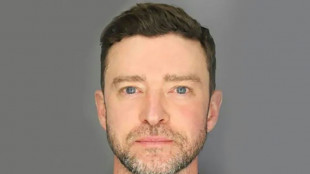
-
 US defends law forcing sale of TikTok app
US defends law forcing sale of TikTok app
-
Messi out for defending champ Miami as Leagues Cup begins

-
 Australia bans uranium mining at Indigenous site
Australia bans uranium mining at Indigenous site
-
Divers attempt to reach sunken Philippine oil tanker

-
 Trump accuses Harris of anti-Semitism in overblown speech
Trump accuses Harris of anti-Semitism in overblown speech
-
Blinken set for talks with Chinese foreign minister in Laos

-
 Coughlin clings to lead at LPGA Canadian Women's Open
Coughlin clings to lead at LPGA Canadian Women's Open
-
Trump offers tech sector policy flips ahead of election

-
 Spacecraft to swing by Earth, Moon on path to Jupiter
Spacecraft to swing by Earth, Moon on path to Jupiter
-
What's the fallout of Mexican drug lords' capture?

-
 Video game makers see actors as AI 'data,' says union on strike
Video game makers see actors as AI 'data,' says union on strike
-
Chinese qualifier Shang to face Thompson in ATP Atlanta semis

-
 Concern grows as Venezuela blocks election observers
Concern grows as Venezuela blocks election observers
-
'Massive attack' on French rail threatens more chaos

-
 'We did it!': France breathes sigh of relief after Olympics ceremony
'We did it!': France breathes sigh of relief after Olympics ceremony
-
Blinken, in Laos, set for talks with Chinese foreign minister

-
 Regional concern grows as Venezuela blocks vote observers
Regional concern grows as Venezuela blocks vote observers
-
Historic river parade, Dion show-stopper ignite Paris Olympics

-
 Rainy Paris Olympic parade dampens many spectators' spirits
Rainy Paris Olympic parade dampens many spectators' spirits
-
G20 pledges to work together to tax ultra-rich

-
 The one of a kind Paris opening ceremony: five memorable moments
The one of a kind Paris opening ceremony: five memorable moments
-
Justin Timberlake seeks to dismiss DUI case

-
 Warner Brothers Discovery sues NBA over Amazon rights deal
Warner Brothers Discovery sues NBA over Amazon rights deal
-
Kobe Bryant locker, Maradona jersey up for auction in New York

-
 Historic river parade launches Paris Olympics
Historic river parade launches Paris Olympics
-
Stocks rise as US inflation data boosts rate cut hopes

-
 New York family of Holocaust victim reclaims Nazi-looted art
New York family of Holocaust victim reclaims Nazi-looted art
-
NASA Mars rover captures rock that could hold fossilized microbes

-
 Thousands evacuate season's biggest wildfire in northern California
Thousands evacuate season's biggest wildfire in northern California
-
Sinaloa Cartel co-founder pleads not guilty after stunning US capture

-
 Ethiopia mourns victims of landslide tragedy
Ethiopia mourns victims of landslide tragedy
-
Lady Gaga adds sparkle to star-studded Olympic show

-
 Airbus and Boeing supremacy secure despite turbulence
Airbus and Boeing supremacy secure despite turbulence
-
Teams sail down Seine in rain-soaked Olympics opening ceremony

-
 Norris hoping for more after topping Belgian practice times
Norris hoping for more after topping Belgian practice times
-
West Indies' treble strike rocks England in third Test

-
 Trump slams rivals as he meets Netanyahu in Florida
Trump slams rivals as he meets Netanyahu in Florida
-
Olympic opening ceremony under way on River Seine

-
 Mott's England future uncertain as ECB chief fails to offer support
Mott's England future uncertain as ECB chief fails to offer support
-
Trump meets Israeli PM Netanyahu in Florida

-
 S.African police say 95 Libyans detained at suspected military camp
S.African police say 95 Libyans detained at suspected military camp
-
Blinken set for talks with Chinese counterpart in Laos

-
 Norris heads Piastri in McLaren one-two at Belgian GP practice
Norris heads Piastri in McLaren one-two at Belgian GP practice
-
G20 seeks common ground on taxing super-rich

-
 European medicines watchdog rejects new Alzheimer's drug
European medicines watchdog rejects new Alzheimer's drug
-
Harris gets vital Obama backing in battle against Trump

-
 Habib, Ebden eye Alcaraz and Djokovic shocks at Olympics tennis
Habib, Ebden eye Alcaraz and Djokovic shocks at Olympics tennis
-
Stocks rise as inflation data boosts rate cut hopes

-
 Long queues, ticketing problems ahead of Paris opening ceremony
Long queues, ticketing problems ahead of Paris opening ceremony
-
Two Sinaloa Cartel leaders face US charges after stunning capture


Six knee surgeries a distant memory in Kubler's Wimbledon breakthrough
Despite six knee surgeries and a world ranking that once nose-dived out of the top 1,000, Jason Kubler always believed he could make the tennis grade, maybe just not at Wimbledon.
The 29-year-old Australian reached the last 16 on Saturday with a five-set win over fellow qualifier Jack Sock.
His three victories at the All England Club this week are his first in the main draw of a grass-court event.
It is a scenario that would have seemed unlikely six years ago when he was off tour for an entire year following another bout of knee surgery.
There had already been a series of operations in his teens as a consequence of a hereditary knee condition.
"I've had five on the left, one on the right," said former world junior number one Kubler, matter-of-factly.
To protect his troublesome knees, he even played exclusively on clay courts from 2012 until 2015.
If that was not dispiriting enough, he then sat out an entire year between 2016 and 2017 to rest after another surgery.
At the end of the 2016 season, Kubler was down at 1,063 in the rankings.
"There's definitely been tough times. But I made a promise to myself when I had my last knee surgery, I really just wanted to enjoy what I'm doing," he said.
"Obviously it's been an up-and-down sort of career for me but I can definitely look back and go 'I've enjoyed the tennis'."
- 'I didn't have money' -
During his year out, Kubler turned to coaching and acting as a hitting partner for other players to make ends meet.
That's when he came close to quitting his professional career.
"I probably did that for two or three months when I didn't have so much money," said the world number 99.
However, he performed well enough in low-key tournaments, which opened a wild card door at the 2018 Australian Open, eight years after he had first appeared in his home Grand Slam.
"If I didn't do as well back then, I doubt I would have kept going. I didn't have any money and not to brag, but I was doing all right with the hitting and the coaching stuff.
"Obviously I'm happier doing this sort of stuff."
Later in 2018, he made the first round at Wimbledon after coming through qualifying and the second round of the US Open.
This year, he reached the second round as a qualifier at the French Open.
He did not play a grass court event in the run-up to Wimbledon but his knees held up well on Saturday.
At four hours and 15 minutes, his 6-2, 4-6, 5-7, 7-6 (7/4), 6-3 win over Sock was the longest match of the men's tournament so far.
"This is a great moment for me and hopefully I can keep doing similar things," he said.
"But I definitely don't feel sour about what's happened. Maybe if I had handled situations differently when I was younger, maybe this could have come earlier."
Next up for Kubler is a last-16 clash with US 11th seed Taylor Fritz on Monday.
The pair met in the second round of the US Open in 2018 when Kubler was injured again, this time after rolling his ankle.
"When he's healthy, has a chance to play a lot, get the game going, he's a really good player," said Fritz.
Whatever the result Monday, Kubler's bank balance will have a healthier appearance.
By making the last 16, he is guaranteed £190,000 ($230,000).
J.Fankhauser--BTB
